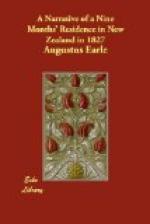remained almost stupefied on the spot, Mr. Fannen
said that he heard the cannibals assembling in the
woods, on which we returned to our boat, and having
hauled alongside the canoes, we demolished three of
them. During this transaction the fire on the
top of the hill disappeared, and we could hear the
savages in the woods at high words, quarrelling, perhaps,
on account of their different opinions, whether they
should attack us and try to save their canoes.
They were armed with long lances, and weapons not
unlike a sergeant’s halbert in shape, made of
hard wood, and mounted with bone instead of iron.
We suspected that the dead bodies of our people had
been divided among those different parties of cannibals
who had been concerned in the massacre, and it was
not improbable that the group we saw at a distance
by the fire were feasting upon some of them, as those
on shore had been where the remains were found, before
they had been disturbed by our unexpected visit.
Be that as it may, we could discover no traces of more
than four of our friends’ bodies, nor could
we find the place where the cutter was concealed.
It now grew dark, on which account we collected carefully
the remains of our mangled friends, and, putting off,
made the best of our way from this polluted place.
When we opened the upper part of the Sound, we saw
a very large fire about three or four miles higher
up, which formed a complete oval, reaching from the
top of a hill down almost to the water-side, the middle
space being enclosed all round by the fire, like a
hedge. Mr. Burney and Mr. Fannen having consulted
together, they were both of opinion that we could,
by an attempt, reap no other advantage than the poor
satisfaction of killing some more of the savages.
Upon leaving Grass Cove we had fired a volley towards
where we heard the Indians talking, but by going in
and out of the boat our pieces had got wet, and four
of them missed fire. What rendered our situation
more critical, it began to rain, and our ammunition
was more than half expended. We, for these reasons,
without spending time where nothing could be hoped
for but revenge, proceeded for the ship, and arrived
safe aboard before midnight.’”
It is a little remarkable that Captain Furneaux had
been several times up Grass Cove with Captain Cook,
where they saw no inhabitants, and no other signs
of any but a few deserted villages, which appeared
as if they had not been occupied for many years, and
yet, in Mr. Burney’s opinion, when he entered
the same cove, there could not be less than fifteen
hundred or two thousand people.
On Thursday, the 23rd of December, the Adventure departed
from, and made sail out of, the Sound. She stood
to the eastward, to clear the straits, which was happily
effected the same evening; but the ship was baffled
for two or three days with light winds before she
could clear the coast. In this interval of time
the chests and effects of the ten men who had been
murdered were sold before the mast, according to an
old sea custom.




